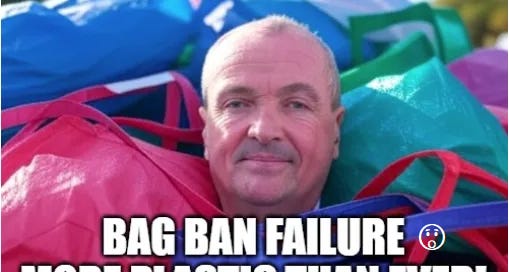NJ Banned Bags, Gained Plastic. Nailed it!
We’re Still Killing the Planet—Just More Expensively Now
Imagine trying to save New Jersey from overflowing landfills by banning single-use plastic bags, only to discover that the ban actually led to more plastic.
DOH!
Bag Ban Concerns
Back on May 4, 2022, the Democratic politicians decided to ban single-use plastic bags, expecting to reduce plastic pollution and promote environmental sustainability. This simple idea sounded decent unless you consider the following:
Sturdier multiple-use bags require significantly more plastic to produce than flimsy single-use bags. Single-use plastic bags weigh in at 6 grams of plastic, whereas the multiple-use products WPP (Woven Polypropylene) and NWPP (NonWoven Polypropylene) weigh 92 to 120 grams of plastic. Other plastic bags, such as PET and nylon, are also heavier, averaging 160 grams per bag. So, fewer bags used don't result in less plastic when each new bag is a behemoth chunk of plastic.
Thicker, multi-use bags demand more resources and energy, leading to greater emissions. The manufacturing process of the polypropylene used to create these sturdy bags has been found to have a high impact on other environmental resources, not just plastic production. The conversion of crude oil into polypropylene resin, through processes like fractional distillation and polymerization, is energy-intensive. Not only do multi-use bags use more fossil resources, but they also impact human toxicity, acidification, and petrochemical oxidant formation. While single-use plastic bags are not without their environmental issues, studies consistently show that if all bag types are only to be used a few times, the single-use plastic bags would have the lowest carbon emissions
People treat "multiple-use" bags like disposable bags. 90% of all alternative reusable bags are reused only two to three times before being discarded. To put it into perspective, reusable nonwoven polypropylene bags need to be reused at least 52 times to reduce the overall environmental impact. Woven polypropylene (WPP) bags require 16 to 98 reuses to match the environmental impact of thin plastic bags.
Bag Ban Results
Last year’s environmental impact report evaluated New Jersey’s bag ban and found that Polypropylene plastic used to produce NWPP (Non-Woven Polypropylene) and WPP (woven polypropylene) resulted in an increase, where plastic consumption for NWPP went from 12 to 80 million pounds. In one year, Greenhouse gas (GHG) emissions went up from 221 million to 311 million kg.
Great job, Murphy and friends!
According to the impact report titled “New Jersey Plastic Retail Bag Market Assessment”, the New Jersey bag ban led to "greenhouse gas emissions (ie, CO2) expanded more than 500%" due to "the larger carbon footprint of a polypropylene bag." This dramatic increase is largely attributed to the sheer volume of plastic involved. The report explicitly tied it all together, stating that "polypropylene plastic consumed to produce NWPP and WPP bags grew by more than 6x" after the ban, noting that "polypropylene bags weigh significantly more than single-use plastics." The irony of these so-called "reusable" bags is that they are so thick you could probably use them to pave a new road.
The Tyranny of Good Intentions: Why Laws Can’t Control Human Behavior
New Jersey continuously tries to legislate behavior for their green energy initiative as if human nature can be reprogrammed overnight by banning a product or mandating a lifestyle shift. But real change doesn’t come from forcing residents to hoard reusable bags like trophies of moral compliance; it comes from cultural shifts, innovation, and incentives, not punitive measures that end up creating new problems, like thicker plastic waste.
And the cherry on top of this environmental farce? We went from free bags to retailers taking a profit to sell these "eco-friendly" alternatives. Because, naturally, "saving the planet" means more plastic, more carbon emissions, and a fatter bottom line. It’s almost like every move out of Trenton somehow ends with more money coming out of our pockets.
The New Jersey Legislature should have started with a pilot program before rushing to pass a statewide law. Now, even though it's clear that the single-use bag ban has backfired, we’re stuck with this policy simply because “it’s the law.” And once a law makes it onto the books, it might as well be carved in stone no matter how ineffective or counterproductive it turns out to be. It's as if common sense has been completely exiled from the halls of Trenton.
Find the Report Below:







Not surprising that Murphy and the Trenton morons make decisions based not on reason, science, and critical thinking but on their schoolgirl crush on trendy nonsense inspired by the likes of Al Gore, Greta Thunburg, and other climate hoaxsters.
From day 1 this law was mistake. When we are still using plastic for milk jugs,egg containers,cereal in boxes rapped in plastic bags, fruits/meats still rapped in plastic before being sold,But when it comes to carrying these items home hold up we need polyethylene (PE) or polypropylene (PP) to save the planet. Next was bottled water was to be stopped being sold but i guess they couldn't figure out a way yet.